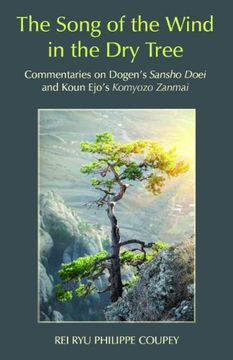The Song of the Wind in the Dry Tree: Commentaries on Dogen's Sansho Doei and Koun Ejo's Komyozo Zanmai
Synopsis "The Song of the Wind in the Dry Tree: Commentaries on Dogen's Sansho Doei and Koun Ejo's Komyozo Zanmai"
The Song of the Wind in the Dry Tree is a book of commentaries given by Zen Master Philippe Coupey from two 13th-century Japanese texts. In Part I, he's chosen twelve poems from the Sansho Doei, a collection of poetry composed by Master Dogen Zenji between 1245 and 1253. In Part II, Coupey comments on the complete text of Komyozo Zanmai, written in 1278 by Dogen's disciple and successor, Master Koun Ejo. Reciting and commenting on the sayings of the elders is a style of practice that Zen has fostered. Teachers in this tradition hold that ancient poems and writings actually transmit and enrich the fundamental teachings. These writings bring life and renewed vitality to authentic experiences of the Zen tradition, outside of time, to contemporary Zen practitioners. The author's fresh interpretation of these two classic texts should be taken as the resonance of an intimate and fundamental experience which, beyond space and time, is addressed to our heart, shedding light on our own quest and ratifying the discoveries that we may have made along the way. Clearly, then, the message of this book is not intended to come under the heading of scholarship or to add to our intellectual baggage, but to enrich our spiritual life. The twelve poems that Philippe Coupey has chosen from Dogen's Sansho Doei are clear and obvious observations of nature. They comprise a rich facet of Dogen's poetic sensitivity, set entirely in the immediacy of real life, a direct experience of ordinary consciousness. Dogen's poems refer to nature; nonetheless, they speak of the experience of awakening at every opportunity. "Even if [the poems of the Sansho Doei] refer to nature, to landscapes, seashores, the passing of springtime," Coupey tells us, "it is always consciousness that is the subject. Free, natural, ordinary consciousness that is neither for nor against." In Part II, Philippe Coupey's commentary on Ejo's teaching, Komyozo Zanmai, he explains that this timeless teaching is a pure jewel that encapsulates and exudes the purest essence of transmitted Zen. In Coupey's view, this 13th century treatise is absolutely not different from that which Zen disciples have received through the ages and are in turn, transmitting today. These sayings of the masters Dogen and Ejo, constitute a precious form of transmission. "This is how zazen, the Way, should be studied," Coupey asserts.

